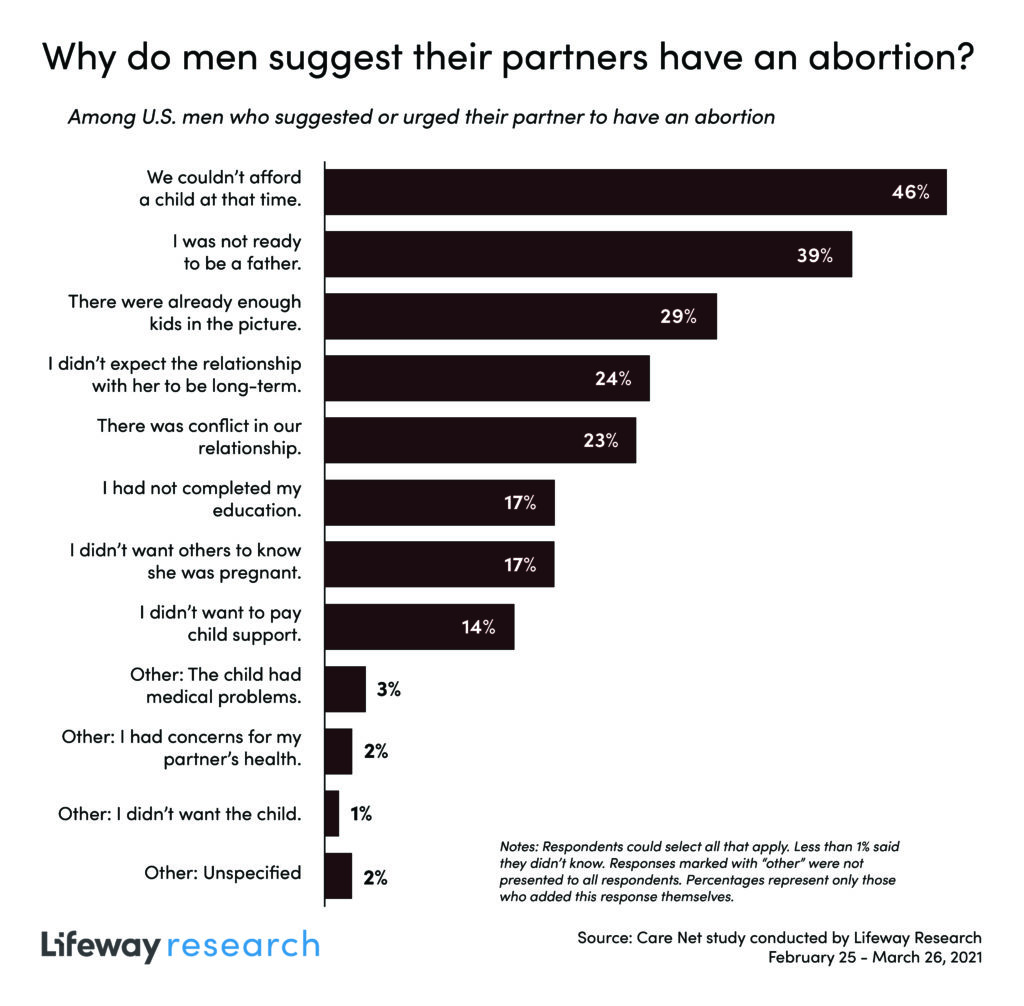
Most of the time, the pregnancy and subsequent abortion happened in the context of a serious relationship. A third of men (34%) say they were married at the time of their partner’s abortion, while another 29% were living together. An additional 29% say they were “seeing each other.” Few say they knew each other but were not dating (3%), had just met (2%) or were no longer together at the time of the abortion (3%).
When asked what roles they believe most people they know expect men and women to play in abortion decisions, 2 in 3 men whose partners had an abortion say the expectation is that the decision belongs to the woman, including 21% who say it is the woman’s choice and the man has no role to play and 46% who say it is the woman’s choice but the man should have some input. Around 3 in 10 (29%) say people expect it to be a choice the two should make together with equal input. Few (3%) say the expectation is the decision should primarily or exclusively be the man’s.
When asked what expectations they believe society places on them in a discussion surrounding unplanned pregnancies, 40% of men whose partners had an abortion say they believe others would want them to neither encourage nor discourage the woman’s decision in any way. Around a third (32%) believe society thinks the man should encourage the woman to have the baby. Fewer (14%) say others believe the man should encourage the woman to abort. And 14% are not sure what society thinks.
Abortion Discussions
According to the men involved, they were most likely to be the one with whom their partners discussed having an abortion. Around 3 in 4 men (74%) say their partners talked with them about the decision before getting an abortion. Close to half (48%) say their partners talked with a medical professional. Some men also say the woman spoke to her mother (38%), a friend or friends (33%), her father (17%), an abortion provider (17%) or another family member (13%). Few men believe their partner spoke with someone at a pregnancy care center (7%), a counselor (5%) or someone at a local church (3%).
Men are most likely to say they were the most influential person in their partner’s decision to have an abortion. Close to 4 in 10 men (38%) say they had the most influence. Fewer point to a medical professional (18%), the woman’s mother (14%), her friends (7%), an abortion provider (4%), her father (3%) or another family member (2%).
The men involved are less likely to say they spoke about the decision to have an abortion with others. More than 2 in 5 (43%) say they only discussed it with their partner. Fewer than 3 in 10 say they had conversations with a medical professional (29%), a friend or friends (29%) or their mothers (27%). Even fewer say they spoke with their father (17%), another family member (11%), someone at church (5%), a counselor (5%) or someone at a pregnancy care center (5%).
“Nobody can deny that men have significant influence in many abortion decisions,” said Warren. “Both women and men who have faced an unplanned pregnancy say the man is consulted in the majority of cases and is most frequently cited as having the most influence.”
At the time of the abortion, most men (54%) say they knew of local pregnancy centers that offer help, but 2 in 5 were not aware of such places.
Church Connections and Disconnects
While few men say they or their partner spoke with someone at church during their discussions about abortion, half of men (51%) say they were attending a Christian church once a month or more at the time of at least one of their partner’s abortions. Even more (66%) say they currently attend religious services at least monthly.
More than 2 in 3 men whose partners have had an abortion (68%) identify as a Christian, including 36% Catholic, 17% Protestant, 10% nondenominational and 5% Orthodox. Around a quarter (24%) are religiously unaffiliated, with 10% giving no religious preference, 7% atheist and 6% agnostic. Fewer men whose partners have had an abortion say they are Jewish (2%) or Muslim (2%). When asked specifically if they are an evangelical or born-again Christian, 46% of men say yes, while 52% say no.

